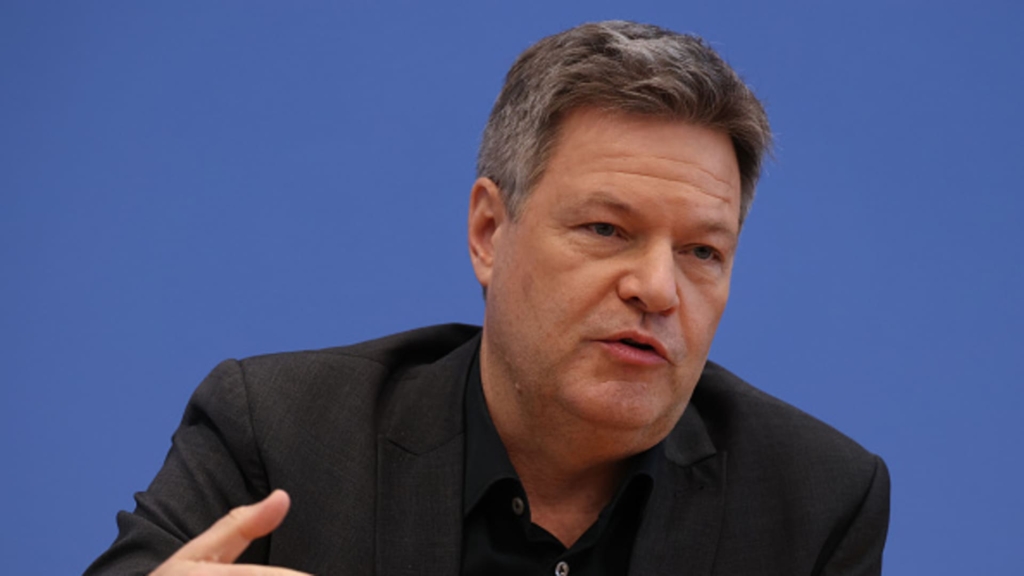Robert Habeck, the acting German economy minister, stated on Thursday that U.S. President Donald Trump would likely change his tariff policies if Europe unites in opposition. During a press conference, Habeck expressed confidence that Trump would “buckle under pressure” and amend his announcements if he encounters significant resistance.
“That is my observation: Donald Trump will buckle under pressure, and he will need to feel that pressure,” Habeck remarked, emphasizing the importance of a coordinated response from Germany, Europe, and their allies in this ongoing economic confrontation.
“We need to apply that pressure collectively, and we’ll see who prevails in this economic contest,” he said, asserting that trying to appease Trump would not yield favorable results. He called for a “day of determination” to address the trade challenges effectively.
While Habeck acknowledged the need to prevent a full-blown trade war, he questioned the most effective means of achieving this goal.
In addition to these remarks, Habeck emphasized the need for Europe to invest strategically in order to reduce its dependency on external powers. He highlighted the importance of enhancing cloud infrastructure and advancing artificial intelligence and space capabilities, asserting, “We just can’t rely on everyone only being friendly to us anymore.”
This assertion stemmed from the lessons learned during the economic toll Germany suffered due to its reliance on Russian energy following the outbreak of the Russia-Ukraine war. “Germany paid a heavy price for this economic and energy policy naivety, and it is essential we do not replicate these mistakes in other sectors,” Habeck added, indicating that addressing these vulnerabilities will be a key priority for the incoming government.
‘Poorly thought through decisions’
In a related context, outgoing German Chancellor Olaf Scholz criticized Trump’s recent tariff decisions as “fundamentally wrong.” According to a translation by Finance Newso, Scholz argued that these measures threaten the global trade order and described them as “poorly thought through decisions” that could have detrimental effects on the global economy, suggesting that the current U.S. administration is charting a course that is destined to produce losers.
This comes in the wake of Trump announcing hefty 20% tariffs on the European Union, implicating Germany, which is significantly reliant on trade. This policy shift is part of a broader “reciprocal tariff” initiative rolling out by the Trump administration.
Germany’s status as a major trading partner for the U.S.—with a trade volume of €252.8 billion ($278.7 billion) recorded in 2024—places it in a vulnerable position. The U.S. remains Germany’s most significant trading partner, outpacing China. According to the German statistics office, last year marked a high point for German exports to the U.S.
In the wake of these tariffs, the DAX index was down approximately 1.6% by 10:42 a.m. London time, with German government bonds also taking a hit; the yield on the 10-year Bund fell over 7 basis points to 2.648%, while the 2-year Bund yield saw a decline of more than 11 basis points, settling at 1.93%.
EU preparing countermeasures
European Commission President Ursula von der Leyen responded by stating that the EU is gearing up to implement countermeasures against Trump’s latest tariffs should negotiations falter. “We are prepared to respond,” she affirmed, adding that the EU is working on further protective measures for its interests and businesses.
Von der Leyen also urged a transition “from confrontation to negotiation,” suggesting there is still time for dialogue between the EU and the U.S. Echoing a cooperative spirit, Chancellor Scholz reaffirmed that Europe would stand firm in defending its interests.
He stated, “Europe will react united, strong, and proportionally to the decision by the U.S.” and emphasized the importance of collaborative efforts in the face of these challenges.


























